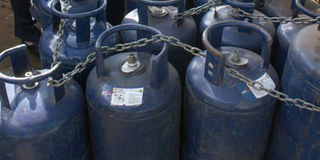Unlicensed gas dealers to pay Sh1 million fine in new rules

The price of cooking gas has dropped to a five-month low. In February, a 13-kilogramme cylinder retailed at Sh2,846, down from Sh3,111 last September, which was also the highest price in the last two years, according to data from the Kenya National Bureau of Statistics. FILE PHOTO |
What you need to know:
- Regional body recommends setting up an inland storage and refilling facility
- For the first time, the regulation will also accord the market regulator powers to arrest offenders
- The new law will also see the Energy Regulatory Commission given powers to arrest offenders, unlike the present situation where it has to rely on other bodies like county agencies, the Kenya Bureau of Standards, the Anti-Counterfeit Authority and the Kenya Revenue Authority.
Unscrupulous traders dealing cooking gas will now be fined up to Sh1 million a significant increase from the current Sh5,000 under new regulations contained in the Energy Bill 2014, meant to streamline the vital sector.
“We have recommended stiffer penalties to act as deterrents,” said Petroleum Institute of East Africa general manager Wanjiku Manyara, noting that the sale of liquefied petroleum gas (LPG) had attracted many unlicensed dealers, thus compromising the quality of gas as well as the safety of the customers.
The new law will also see the Energy Regulatory Commission given powers to arrest offenders, unlike the present situation where it has to rely on other bodies like county agencies, the Kenya Bureau of Standards, the Anti-Counterfeit Authority and the Kenya Revenue Authority. This affects the commission’s efficiency as inspection and enforcement activities are often dependent on the availability of officers from these agencies.
Market analysts say the use of gas as an alternative to traditional fuel is set to grow as the country develops storage infrastructure and the prices drop which requires that the government tighten the legal framework to ensure consumers are protected from unscrupulous traders.
“There should be increased capacity for enforcement or regulations will not work,” a source familiar with the LPG market who sought anonymity for business reasons said.
NUMEROUS SALE POINTS
With an increase in LPG consumption, numerous sales points have sprouted in residential estates which even sell unbranded cylinders.
Some traders are involved in the illegal refilling and branding of cylinders and use cylinders that do not meet the quality assurance standards of the Kenya Bureau of Standards, thus compromising consumers’ safety.
“The powers of the Energy Regulatory Commission are not exhaustive and should be increased to include the powers of seizure and confiscation, demolition of unlicensed, risky, unsafe, hazardous and illegal sites. Complete powers, akin to those in Sections 22 and 23 of the Anti-Counterfeit Act of 2008, need to be included to rid the sector of shady traders and dealers,” Ms Manyara said.
The Petroleum Institute of East Africa has also recommended that value added tax on liquefied petroleum gas be removed to boost its use in the country that has seen the cost of a 13-kg gas cylinder increase from an average of Sh3,000 to Sh3,200 after the introduction of the 16 per cent VAT recently.
“The PIEA has engaged the services of a task force and made verbal and written contributions to the policy and Energy Bill, and though we did not get all our recommendations worded exactly as we would have wished, we are gratified that the majority of our proposals were taken into consideration and included in both the policy and the bill,” Ms Manyara said.
The government has been promoting the use of gas to reduce the use of wood fuel that contributes to environmental degradation, but the prices have remained high, making it unaffordable for the majority of the population.
According to the Energy Regulatory Authority, current annual LPG consumption is estimated at about 90,000 metric tonnes, roughly translating to a per capita consumption of 2.25kg, which is below the average per capita consumption of 3kg in Africa.
But some experts say the amount of LPG consumed could be as high as 130,000 metric tonnes, owing to the fact that gas that enters the market through unofficial channels is not recorded.
“The gas has to be made affordable through the liberalisation of the market to allow more players to access the commodity,” said Mr George Wachira, a consultant at Petroleum Focus.
Experts say the consumption is expected to peak to about 200,000 metric tonnes if constraints in the current supply chain such as the 16 per cent VAT are removed.
Ms Manyara said once an inland LPG storage and refilling facility is established as recommended by the Institute, the cost of LPG would drop significantly.
She also said PIEA would lobby participants at the first African LPG summit July 2-4 in Nairobi to increase investment in regional LPG facilities.





